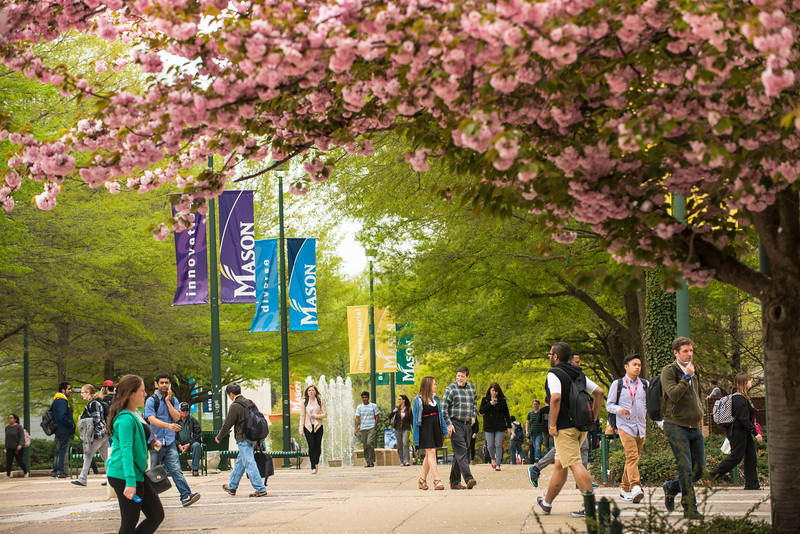Contact us
Have questions? Contact us at vsegadm@gmu.edu
Summer Research Program applications are now closed.
Applications for the summer program will open on this page in the future. In the meantime, explore our graduate programs.
If you are interested in PhD studies in engineering, computer science, and statistics and curious enough to come to the Washington D.C. area, our summer research program may be for you.

Mason Engineering graduate students will find a community, study and research resources, and fun opportunities to fill downtime on the Fairfax campus.
We're recruiting top undergraduates and master's students to conduct research with us from July 6 to July 24, 2020. It's a chance for you to get to know us, for us to get to know you, and to collaborate on a real research project that might turn into something more both here and at your current university.
You will live in the George Mason University dorms in the Northern Virginia suburbs of Washington, D.C., working on faculty-led research solving real problems during the week. On the weekends, you can tour the nation's capital, check out the city's entertainment scene in Georgetown or Adams Morgan, go to a Washington Nationals major league baseball game, or ride the bus to New York City.
"During my stay at Mason for [the] 3DR summer program, I developed strong ties with the faculty and PhD advisor… that's why I decided to join the College of Engineering and Computing. The faculty members at CEC are amazing both from [a] technical point of view and assisting students in their research.
…[I]f you are looking to nurture your abilities and sharpen your skills then [the] 3DR program would introduce potential students to some of the latest technology and research being conducted."
Who can apply?
Admission to this program is competitive. Here are the guidelines:
- You must be a full-time undergraduate or full-time master's student graduating from your current institution in 2021.
- You must be thinking about PhD studies in an engineering program at George Mason University.
- You must be interested in the research projects listed below, and you must have the skills needed to contribute to the project.
- You must have a strong positive recommendation from a faculty member at your current institution.
What does it cost?
- There is no application fee for this program.
- If you are accepted, you will live in George Mason University dorms on campus, and your accommodations and meals from July 6 - July 24 will be paid for by Mason.
- You will be responsible for transportation to and from campus and any other personal expenses and discretionary spending (for example: shopping and traveling). Personal expenses can average from $250 to $500.
- In addition, international students who require a visa will be responsible for:
- return air and ground transportation costs from your home country to our campus,
- your U.S. B1/B2 prospective student visa application costs,
- if applicable; your health insurance for the period of the program.
What's the schedule?
- We will review applications as they arrive, so early application is recommended for the best consideration.
- Reviews will begin immediately. We will follow up with selected candidates and their recommending professors.
- Offers of admission to the program will be extended starting in February; applicants have seven days to accept or decline an offer.
- International students only: If you are accepted into the program, you must apply for and receive your visa (if the U.S. requires one for your visit) by March 1; we will provide a letter of invitation to accompany your visa application. You must confirm purchase of both your health insurance and your flight to the Washington D.C. area by June 1.
- Arrrive at the university to move into your dorm room on Saturday, July 4 or Sunday, July 5.
- Program orientation will begin on Monday, July 6. You will conduct research under the direction of a College of Engineering and Computing faculty member on weekdays, but weekends are yours to explore the area.
Summer 2020 Research Topics
|
(BIOE1) Precision delivery of vaccines |
(WE'RE SORRY. THIS RESEARCH PROJECT IS NO LONGER AVAILABLE FOR APPLICATIONS RECEIVED MARCH 2ND AND ONWARD TO CHOOSE FROM. PLEASE SELECT FROM THE PROJECTS LISTED BELOW) |
Preferred academic background: biomedical engineering, chemistry, physics, biology |
|---|---|---|
|
(BIOE2) Restoring capabilities to people with missing limbs |
This research develops next generation prosthetics and exoskeletons for people with missing limbs and mobility difficulty. Students work at the intersection of neuroscience, medical imaging and biomedical engineering. |
Preferred academic background: MATLAB, prior laboratory experience |
|
(BIOE3) Defeating arthritis |
Arthritis disables many people and especially older adults. This research uses ultrasound imaging to understand the roles of mechanical and enzymatic catabolic stress on arthritic joints, to explore ways to regenerate bones and cartilage. |
Preferred academic background: MATLAB, programming, 3D image analysis, histology, tissue culture |
|
(BIOE4) Creating tools for personalized medicine |
Personalized medicine allows us to tailor treatment for disease to each person's unique characteristics. It also requires far deeper understanding of the disease. This research uses polymers introduced into the blood to reveal details of infection and inflammation. |
Preferred academic background: molecular cell biology, aseptic technique, immunology |
|
(COMP1) Instructable cognitive agents for cybersecurity |
Research a computational theory of evidence-based reasoning for instructable cognitive agents, enabling everyone to be a programmer by teaching the agents to perform evidence-based reasoning tasks, such as computer intrusion detection or medical diagnosis, rather than programming them. Apply the theory to develop instructable agents for the autonomous detection of novel computer intrusions. |
Preferred academic background: cybersecurity, artificial intelligence, JAVA |
|---|---|---|
|
(COMP2) Preventing cascading failures in complex IT systems |
(WE'RE SORRY. THIS RESEARCH PROJECT IS NO LONGER AVAILABLE FOR APPLICATIONS RECEIVED MARCH 16TH AND ONWARD TO CHOOSE FROM. PLEASE SELECT FROM THE PROJECTS LISTED ABOVE) |
Preferred academic background: cybersecurity, math, coding (Java preferred) |
